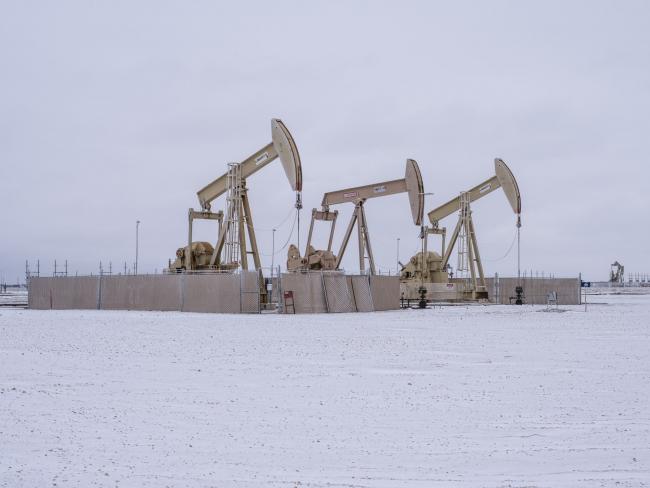(Bloomberg) -- Oil fell the most in nearly a month alongside a broader market selloff with the ongoing energy crisis in the U.S. likely keeping refineries shut for another week.
Futures in New York declined 1% in a choppy trading session on Thursday. While U.S. oil output has plunged nearly 40% amid the unprecedented cold blast in parts of the country, crude demand from refineries is expected to remain weak as Gulf Coast fuel-making plants make repairs and take time to restart following operating issues caused by the freezing temperatures. Further pressuring prices, U.S. equities weakened after initial jobless claims hit a four-week high.
“Right now, we have both refining capacity and oil production down at the same time, so there aren’t particular supply stresses and the market is reflecting that,” said Bart Melek, head of commodity strategy at TD Securities. Meanwhile, despite crude stockpiles declining, there’s a sense that “oil’s rally may be a little overdone.”
See also: Big Freeze in Texas Is Becoming a Global Oil Market Crisis
Technical indicators also show crude is due for a pullback. The 14-day Relative Strength Indexes for both the U.S. and global crude benchmarks remain above 70 in a sign the commodity is overbought. West Texas Intermediate futures are up about 25% this year as Saudi Arabia’s deep output cuts and an improving demand outlook encourage investors.
Still, capping further losses, U.S. crude stockpiles tumbled more than 7 million barrels last week to the lowest in almost a year, according to an Energy Information Administration report on Thursday. The data also showed supplies at the nation’s largest storage hub at Cushing, Oklahoma, fell by the most in a month, while crude output ticked lower.
Traders are assessing the limited available U.S. output with another freeze expected in Texas overnight. Estimates for how long the U.S. outages may last have risen in recent days as analysts try to figure out the timespan involved in thawing out infrastructure.
The supply shock is aiding an already frothy global oil market and is starting to alter energy flows, with traders snapping up ocean-going tankers to haul millions of barrels of European diesel to the U.S.
The inventory declines in the U.S. are “supportive of the general thesis that as the recovery takes shape, refiners are going to uptick and demand is going to increase,” said Quinn Kiley, a portfolio manager at Tortoise, a firm that manages roughly $8 billion in energy-related assets. “There’s a stated goal to reduce capital spending, so that means supply’s going to be weak. That’s a positive setup for prices all around the globe.”
The EIA data also showed distillate inventories fell by more than 3 million barrels last week, while gasoline supplies rose.
Meanwhile, as American barrels are removed from the market, North Sea traders have been frantically bidding for the region’s cargoes. Buyers in Asia, meanwhile, have been snapping up Middle Eastern crude at higher premiums. Brent’s prompt timespread moved further into a bullish backwardation structure this week, reflecting the tightening global supply backdrop, with the nearest contract trading at a nearly 80-cent premium to the following month.
©2021 Bloomberg L.P.

